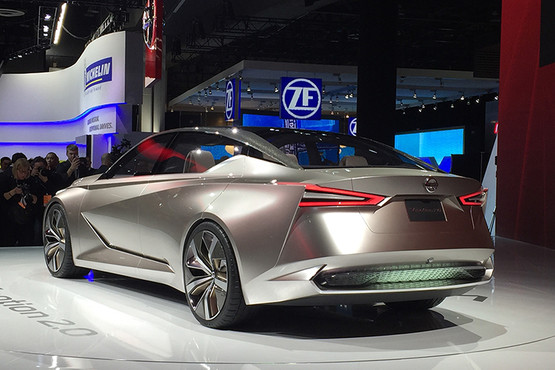Business: China's motor trade Driven to the brink
商业:中国汽车贸易,逼入绝境
Slowing car sales are a threat to shaky dealerships.
汽车经销商如履薄冰,销售放缓雪上加霜。
China's car market used to run like a high-revving engine.
中国的汽车市场发展速度曾如同飞速转动的引擎。
But after double-digit growth in much of the past decade, sales volumes have slowed dramatically.
中国的汽车销量在过去10年的大部分时间都保持着两位数增幅,而今却急剧放缓。

Barclays, a bank, recently revised its growth forecast for 2015 down from 8.5% to just 1.7%.
近期,巴克莱银行对2015年中国汽车市场的增长预期由8.5%下调为仅1.7%。
Others think sales may even shrink.
更有他人认为预期汽车市场甚至会萎缩。
China's car dealers, mostly newcomers to the business and over-reliant on selling new cars for their livelihoods, are struggling to cope.
中国的汽车经销商正应付着艰难的处境,他们中的大多数都刚刚进入这一领域,并过度依赖新车销售为业。
Carmakers frantically expanded their networks when sales were booming, and now China has a surfeit of dealers.
当业绩斐然时,汽车制造商近乎疯狂地拓展销售网络,这使得如今中国的汽车经销商已过饱和。
By the end of 2014 some 26,400 had set up, according to Sanford C.Bernstein, a research firm, 60% more than in America, even though China's new-car sales are just 40% higher.
据调研公司桑福德伯恩斯坦称,到2014年底,约26400家汽车销售网点在中国建立,比美国多出60%,尽管中国的新车销量仅仅比美国高出40%。
Often, carmakers handed out franchises with little regard for the suitability of either the location or the dealers themselves.
汽车经销商往往在发放特许经营权时忽视了市场定位或经销商是否合适。
The German premium marques have done best at building an efficient network.
德国的优质汽车品牌最擅长建立高效的营销网络。
But even their dealers are having to scrap among themselves for custom.
但尽管如此,它们的经销商还是不得不为争抢顾客自相残杀。
There has not yet been much consolidation of car retailing into larger chains of dealers.
汽车零售业向大型销售链的整合尚未普及。
The 100 biggest dealership firms have just a fifth of total outlets; almost three-fifths are single-site operations, often run by a local entrepreneur with limited capital and even less idea how to flog motors.
中国最大的100家经销公司只占据了汽车销路的五分之一,接近五分之三的销量都被独立业务网点瓜分,而这些网点往往由当地企业家经营——他们资金有限,对汽车营销也知之甚少。
Most are powerless to resist carmakers stuffing their showrooms with surplus stock that requires heavy discounting.
汽车制造商用因库存过多而不得不大打折扣的产品填满了销售点的展示区,对此大多数独立销售网点却无能为力。
Chinese consumers' enthusiasm for haggling is only being reinforced as a result.
这一切都只是进一步激发了中国顾客对讨价还价的热情。
Chinese dealers have neglected the ancillary businesses, from insurance and loans to servicing and spares, that contribute much of their Western counterparts' profits, notes Jochen Siebert of JSC Automotive, a consulting firm.
正如JSC汽车行业顾问公司的约亨·希伯特指出的那样,中国的汽车经销商忽视了从保险、贷款到服务、配件的配套业务,而这些业务正是西方汽车同行重要的利润来源。
Dealers lack the experience to trade the second-hand cars that are now flooding on to the market.
二手车不断地涌向市场,然而经销商却缺乏销售二手车的经验。
Used vehicles account for 14% of profits at American dealerships but just 2% in Chinese ones.
二手车占据了美国汽车经销商利润的14%,在中国,这一数字仅为2%。
Car dealerships' failure to grasp these opportunities has left them open for others to exploit.
汽车经销商错失的市场机会留有他人开发。
Independent service garages, not linked to a car dealer, are thriving.
与经销商脱节的独立汽车维修服务站正蓬勃发展。
Motorists put off by the high prices that dealers try to charge for official replacement parts are flocking to stores that sell cheap copies.
被经销商原装配件的高价吓跑的车主涌向了销售便宜仿造品的商店。
Websites for trading used cars are sprouting.
二手车交易网站方兴未艾。
The low prices dealers are getting for new cars, and their failure to profit from sidelines, are forcing carmakers to bail them out.
低价出售汽车、错失配套市场——面对经销商的困境,汽车制造商不得不出手相救。
BMW, Audi, Volkswagen and Toyota have all given cash to their dealers this year to help cover losses.
今年,宝马、奥迪、大众和丰田均向经销商提供资金以弥补损失。
Carmakers are also belatedly helping them to develop after-sales services and used-car businesses.
制造商对经销商售后服务及二手车交易业务的扶持也姗姗来迟。
China's badly-assembled motor trade needs a complete overhaul.
中国东拼西凑的汽车贸易迫切需要一次大改造。
译文属Brenda











